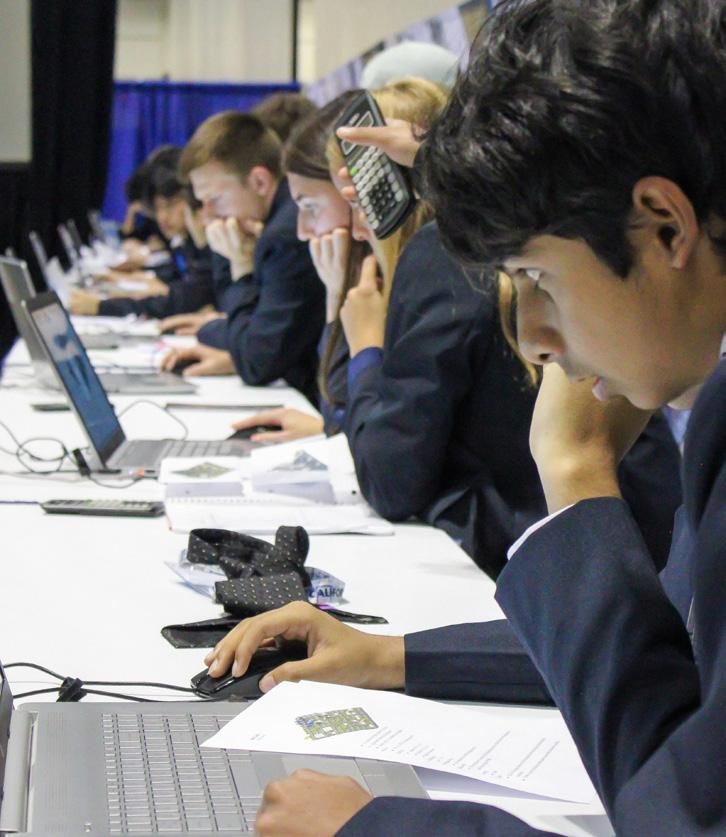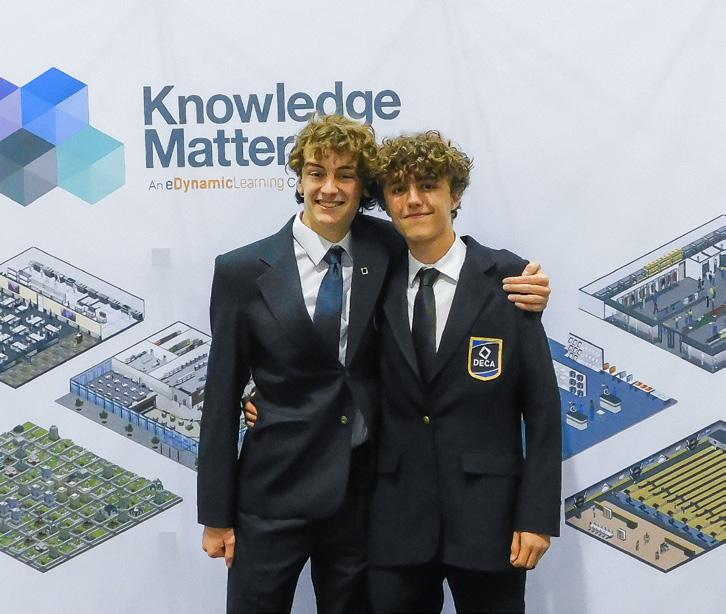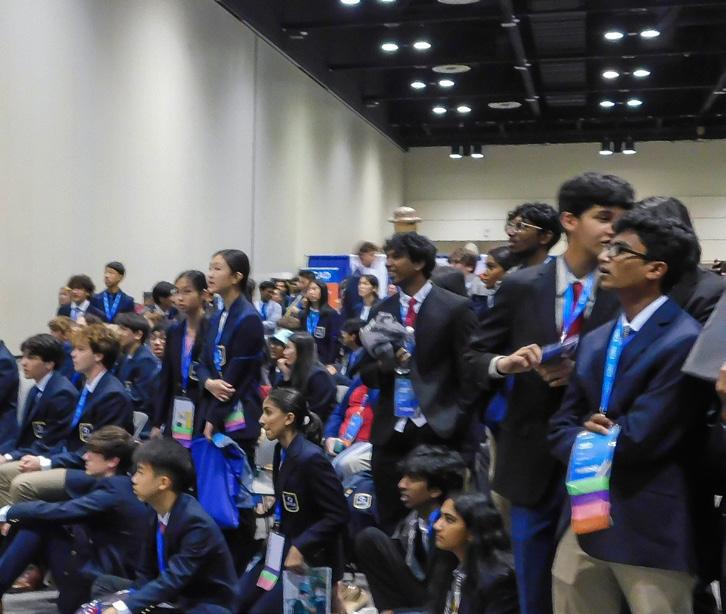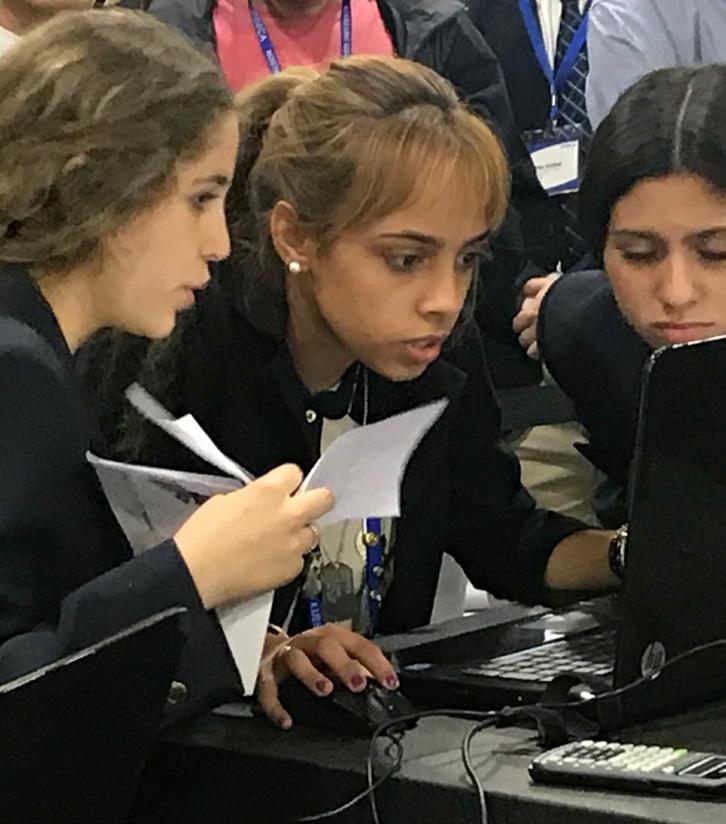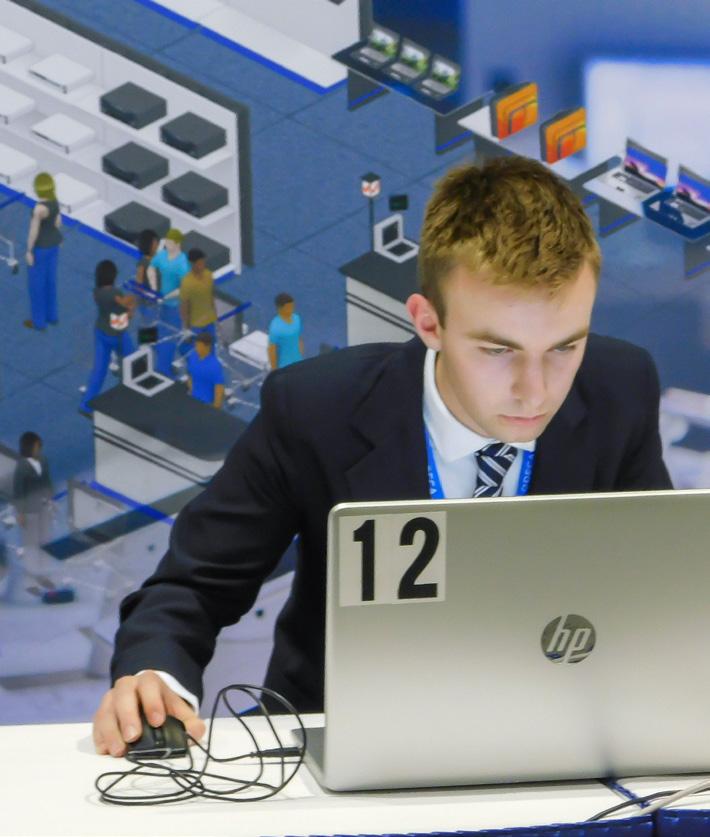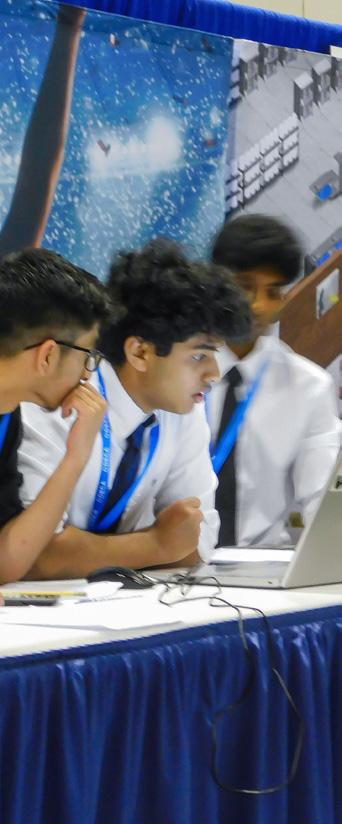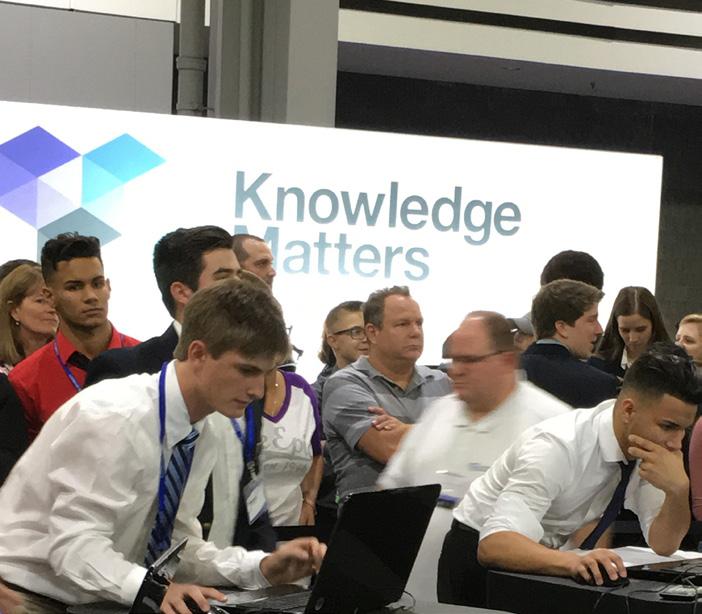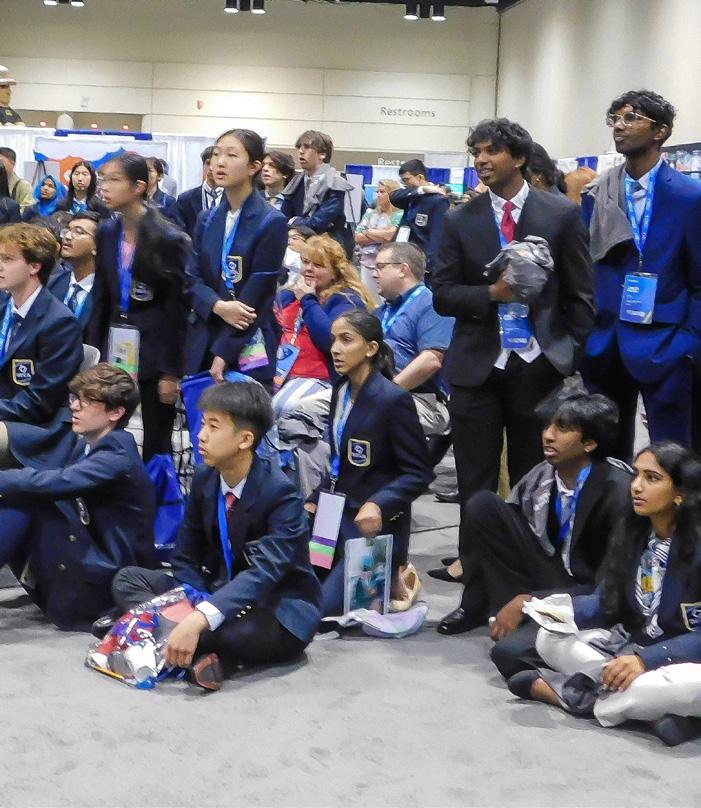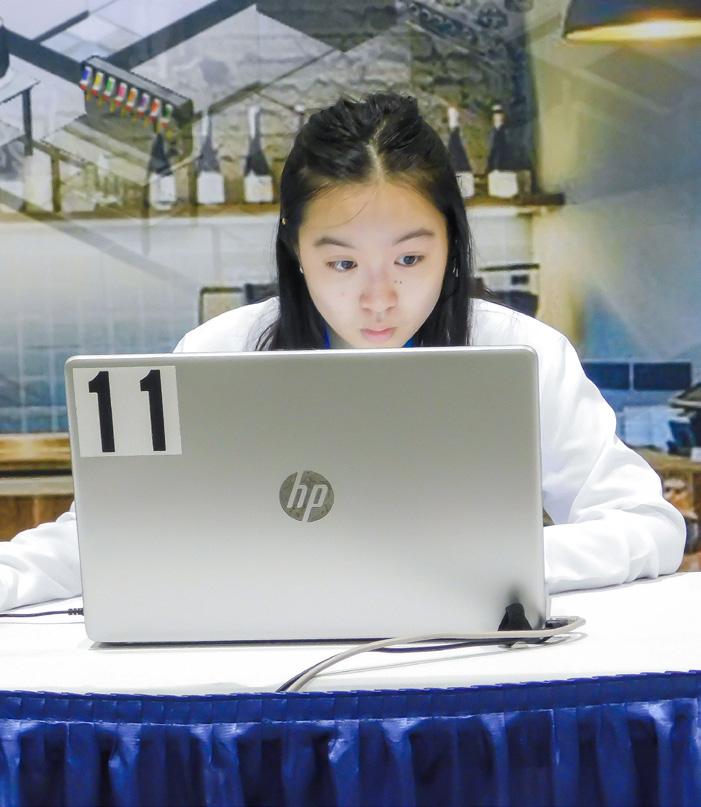Creating a Competitive Advantage: Experiential Learning Through Simulation
Knowledge Matters, an eDynamic Learning company, is the leader in virtual experiential learning for high schoolers. These visual simulations compress years of experience into hours and days, appealing to students and teachers as a more effective tool in achieving useful skill development.
DECA partners with Knowledge Matters to utilize these simulations in a variety of ways, including virtual challenges and competitions to provide students real-world experiences in a risk-free environment. All while preparing emerging leaders and entrepreneurs, and providing practice in skills that boost their confidence.
To gather feedback on how Knowledge Matters and the Virtual Business Challenge impacted students’ journey’s and career paths after high school we interviewed seven former students involved in DECA. Their experiences with DECA, Knowledge Matters’ simulations, and competitions were incredibly informative. You’ll learn how their participation positively impacted their post-graduation plans, and for some, changed their entire career trajectory.
Competitions and Challenges: Practice for the Real World, Risk-Free
In partnership with Knowledge Matters, DECA runs multiple competitions and challenges throughout the year. These virtual challenges allow DECA students to test their business skills in an interactive simulation environment.
Semi-Annual DECA Virtual Business Scholarship Challenge
DECA high school members can participate individually, or as a team of up to three members. There are eight Virtual Business Challenges participants can compete in:
• Entrepreneurship
• Fashion
• Accounting
• DECA Hotel Challenge
• Personal Finance
• Restaurant
• Retailing
• Sports
Annual DECA/Knowledge Matters “Digital Presentation Skills Challenge”
Digital presentation skills are valuable and necessary for successful business leaders in today’s workplace. This challenge tests students’ skills at creating and delivering a digital presentation. With any Knowledge Matters simulation, this challenge is free to participate for any student member of a high school DECA chapter.
“No other arena or way we could have had the experience. The uniqueness of that experience was one of the most memorable things.”
- Samuel Wu, Ontario
From Virtual to the Real World: The Benefits of Hands-On Learning
Students shared three main impacts and benefits of participating in DECA and the Virtual Business Challenges. The first is exposure to business and other career fields students wouldn’t have been pushed to try or otherwise have had access to. Secondly, students gain transferable skills to take with them to any career field, compounding their success and building confidence. Lastly, the interpersonal skills developed and nurtured through the DECA community and challenges are instrumental in preparing students for life after high school. Based on our conversations with previous students, we’ll feature how each of these benefits were brought to life in their own experiences.
Exposure: Exploring the Possibilities, Risk-Free
“One of the great things about DECA is how it gets you exposure to a lot of different disciplines. It makes you much more well-grounded when approaching problems.”
- Matthew Chandler, California
During our interviews one of the key benefits of exposure became very clear. The confidence-building of trying something new, in a risk-free environment. Students have a built-in safety net while discovering new ways to be successful. It encouraged them to push the envelope and see what they could really do. Some of our former members ended up pursuing careers in industries they hadn’t considered before such as retail, hospitality and finance. This exposure to different fields outside the scope of regular curriculum settings is one of the most beneficial parts of these DECA members’ experiences..
For Cooper Johnson in Ohio, the DECA program was just going to be for fun, but he found it pushed him to solidify his future endeavors in business, and he now works in the financial field.
“DECA allowed me to see that there’s a lot more to business than the black and white of it. There are five different divisions of business, and the financing one took off for me. The competing aspect of virtual business was extremely fun. What do I know, what can I use to push myself?”
He believes that the exposure that DECA provides is unmatched, saying that, “I don’t think you can describe how valuable it is to get in front of someone who you don’t know yet, go through a case study, and be able to answer their questions on top of it. Having some kind of experience with that is valuable beyond words because you don’t get that in a regular high school setting.”
Julio Baires in Arizona participated in DECA for all four years of high school, finding success in the personal finance, retailing, accounting, sports and entertainment challenges. He believes that DECA impacted his current career a lot, leading him to his current position as an Operations Analyst for the city of Phoenix.
“What I did during the competition was being very analytical, trying to look for loopholes. That’s what I do now, I test our systems for the city, trying to look for any defects that a customer might encounter. It was a nice exposure learning how the business segment works early in life. If you’re able to follow directions in a simulation or task, you’ll follow a process through, see how effective it is and you can see the benefits of it.”
“The line draws itself. I founded and run a startup building AI and Technology for healthcare, automating the insurance billing process for doctors, exercising the skills I learned through DECA.”
Samuel Wu, Ontario
In large part, producing college- and career-ready students is about helping them discover a field or direction that sparks their interest. While regular classroom curriculum can provide a great deal of this, the simulations and opportunities provided by DECA and Knowledge Matters are tactical and eye-opening. The more possibilities students see for themselves, the larger the world becomes.
Transferable Skills: From Practice to Intuition
In today’s world where facts are available instantly, the competitive advantage goes to individuals who can solve complex problems. The game-based simulations used by participants in the DECA Virtual Business Challenges help students develop problem solving skills, and shore up their analytical side. Even skills such as interviewing, creating a resume or cover letter and following a process are all learned within the flow of DECA and Knowledge Matters simulations. Regardless of the career path they follow, or next steps after high school graduation, the skills learned through DECA can support students in the long run.
Throughout high school, Samuel Wu had always planned on going into STEM, but had been curious about business and wanted to figure out why everyone was so interested in DECA. The experience at DECA opened his eyes to other opportunities and skill sets like networking and finding different ways to problem solve.
During his STEM-focused undergrad, he never lost the drive to run a company, something that sparked during his time with DECA. The knowledge he learned there gave him the inspiration, confidence, and skill set to bring his business to life from scratch. From pitching investors and creating a business plan, to interacting with customers and more.
Samuel says that, “what felt like intuition were [actually] skills I picked up through my time at DECA and had to demonstrate in the role plays and multiple choice. A ton of skills that I take to what I do now, essentially operating businesses.”
For Samuel, he can see a direct path from DECA to where he is today. Not every DECA student can draw a line from A to B in this way, but transferable skills are an essential part of education that DECA is in a great position to support.
Interpersonal Skills: Enhancing Your Everyday Interactions
“Regardless of the career you go into, or next step, [such as] a part time job, the soft skills learned in DECA enhance any skill set.”
- Mateo Espinoza, California
Interpersonal skills are a muscle you can strengthen. DECA and virtual simulations from Knowledge Matters gives students a chance to get reps in. Practicing until it’s no longer a challenge, but an instinct. From public speaking and working in groups during challenges, to building confidence by testing out things you’ve never done, the interpersonal skills you develop at DECA positively compound every other discipline.
Mateo Espinoza found that in the course of working a part-time job while in school, the soft skills he learned in DECA were currently helping him. In addition, the experience of the challenges enhanced his time at school helping him learn from friends and understand how tone, word choice, and emphasis can help you sound natural, instead of rehearsed.
Samuel Reno in Arizona credits DECA and the simulations with helping him gain confidence in how he speaks and presents himself. From decision-making and critical analysis, to creating resumes and applying for jobs, he believes that DECA is, “something that helps no matter what career you choose.”
Matthew Chandler in California believes that soft skills learned in DECA build your confidence in many concepts. “You’re so much more knowledgeable, your conversations are so much more interesting because of the concepts you’re exposed to.” Soft skills are an invaluable skill set to have. From day to day to your pursuit of a career or job. It can make the difference between you and another candidate, or simply broaden your scope of interests.
Now and Then: Former DECA Students Advise the Next Class
“I would love to encourage folks to park their preconceived notions about what DECA is, and what these competitions are and give any of them a shot. They’ll be pleasantly surprised about what might resonate with them and where they’ll find success.”
- Samuel Wu, Ontario
At the end of every interview we asked our former DECA members what advice they had for current DECA high school students, or those interested in joining. While wide-ranging, a theme that continually rose was the idea of “fake it until you make it.” While informal, it honed in on the fact that trying something new, and stepping out of your box will never be easy–but with DECA you have a community and opportunity to work hard and get better at it.
For Mathew Chandler, he believes that, “one really big lesson I learned from VBC and DECA in general is that hard work really does pay off. I competed for many years before winning, and it was through the culmination or rounds of practice, using
the simulations, figuring out new solutions. All that really taught me that if you put a lot of work into something, and if it’s something you really want, you can achieve it if you put your mind to it, and put in the hours. It sounds cliche, but make your dreams come true.”
Julio Baires advised students to: “be involved in DECA as much as they can. Knowledge Matters, competition matters, it helps them and their resume.” He also had a remark on the competitions, “Annotate everything you do for the competition and share your knowledge with others. Knowledge is not something to keep to yourself.”
DECA and Knowledge Matters are a great tool to be woven into the high school experience, and so we hope that there are large elements of fun associated with DECA too.
Finally, for Winston Liu in New York, he says that the main point of DECA is less about the competition, but about the community you meet at the challenges. “You have to break out of your shell and go meet people in your chapter because of the lifelong network you can build from early on. They can help you prepare for the role plays and simulations. The community aspect of DECA is very important.”
Based on these interviews, we’re immensely proud to see that Knowledge Matters’ virtual experiential learning, simulations and challenges have positively impacted DECA members.
Knowledge Matters is committed to helping students develop their full potential through immersive virtual simulations. Our goal is to nurture great leaders and thinkers, by breaking down barriers to opportunity and empowering them to demonstrate their capabilities. Partnering with DECA strengthens these efforts, and the long-term impact on former students is evident.
DECA and eDynamic Learning have the same goal, to prepare students to be college and career ready. Are you ready to bring your own DECA chapter to life, or strengthen it with Knowledge Matters virtual simulations?

